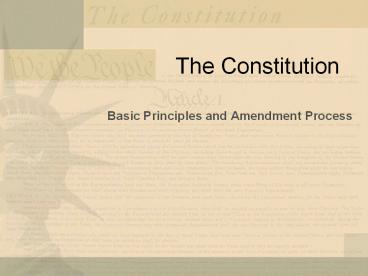The Constitution - PowerPoint PPT Presentation
1 / 20
Title:
The Constitution
Description:
The Constitution Basic Principles and Amendment Process Elements of the Constitution Preamble: Sets the purpose of the Constitution Articles: Establishes our national ... – PowerPoint PPT presentation
Number of Views:158
Avg rating:3.0/5.0
Title: The Constitution
1
The Constitution
- Basic Principles and Amendment Process
2
- "A primary object should be the education of our
youth in the science of government. In a
republic, what species of knowledge can be
equally important? And what duty more pressing
than communicating it to those who are to be the
future guardians of the liberties of the
country?" - -George Washington
- Life Mask of
- George Washington
3
Six Fundamental Principles of the U.S.
Constitution
- Popular Sovereignty
- Limited Government
- Separation of Powers
- Checks and Balances
- Rule of Law
- Federalism
4
Six Fundamental Principles of theU.S.
Constitution
- 1. Popular Sovereignty
- All power comes from the people
- 2.Limited Government
- Government may do ONLY the things that people
give it power to do
5
(No Transcript)
6
(No Transcript)
7
Six Fundamental Principles of theU.S.
Constitution
- 3. Separation of Powers
- Government is divided into three
branches-legislative, executive, and judicial
- 4. Checks Balances
- Each branch of govt can be checked (restrained)
by the other branches
8
(No Transcript)
9
(No Transcript)
10
Six Fundamental Principles of the U.S.
Constitution
- 5. Rule of Law
- The U.S. Constitution is supreme and all
individuals are accountable under the law
- 6. Federalism
- Division of power between a central (national)
and local (state) governments
11
(No Transcript)
12
Elements of the Constitution
- Preamble Sets the purpose of the Constitution
- Articles Establishes our national government
- Amendments Allows for formal changes to the
Constitution
13
The Preamble
- What is the significance of the Preamble of the
United States Constitution? - To form a more perfect union
- To establish justice
- To ensure domestic tranquility
- To provide for the common defense
- To promote the general welfare
- To secure the blessings of liberty
14
Organization of the National Government
- Article I Establishes the legislative branch of
the national government setting forth the two
houses of Congress to make laws - Article II Establishes the executive branch to
carry out the laws passed by Congress - Article III Establishes the judicial branch by
creating the U.S. Supreme Court and empowering
Congress to establish lower Federal Courts to
interpret the laws
15
Amendment Process
- Amendment A formal revision to the Constitution,
responding to the needs of a changing nation - As spelled out in Article V, the Constitution can
be amended by a vote of - two-thirds of the House of Representatives
- and two-thirds of the Senate
- followed by a ratification of three-fourths of
the various state legislatures - To date, there have been 27 amendments to the
original Constitution
16
(No Transcript)
17
Ratification Debates
- Nine of thirteen states needed to ratify
Constitution - Anti-Federalist Position
- Suspicious of a strong central government
- Wanted Bill of Rights to protect personal
liberties - Federalist Position
- A strong central government was the best way to
protect freedom - The Federalist was a series of essays supporting
adoption of the U.S. Constitution
18
The Bill of Rights
- The first ten amendments to the Constitution
- Guarantees civil liberties the rights of
individuals and limitations on federal and state
governments - Freedoms Religion, speech, press, assembly,
petition - Government Limitations Unreasonable search and
seizure, double jeopardy, self-incrimination,
cruel and unusual punishment
19
Selective Incorporation
- Beginning in the 20th Century, the Supreme
- Court used the 14th Amendment (due
- process of law clause) to limit state actions,
- just as the Bill of Rights limits the national
- government
20
"Do you ever have one of those days when
everything seems unconstitutional?"































